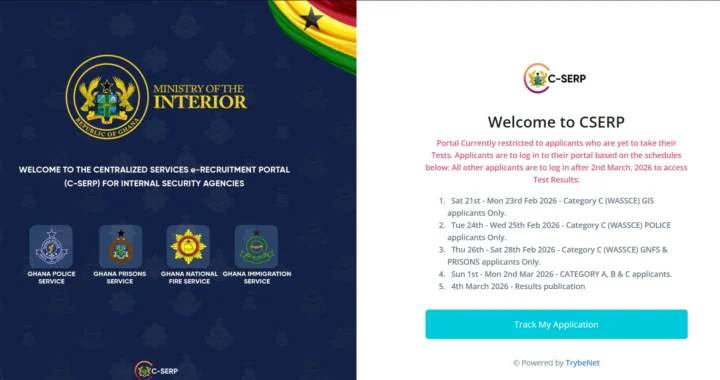Understanding WASSCE Failures: How To Pass 2025 WASSCE for Candidates

The West African Senior Secondary Certificate Examination (WASSCE) represents a pivotal moment in the educational journey of students across West Africa. Conducted annually, this examination is a standardized test that assesses the academic readiness of students completing their secondary education. The significance of the WASSCE extends beyond mere grades; it serves as a gateway to higher education, vocational training, and, ultimately, successful employment opportunities in a competitive job market.
WASSCE is administered by the West African Examinations Council (WAEC) and evaluates candidates in various subjects, including core subjects such as Mathematics, English Language, and Integrated Science, alongside electives that vary based on the student’s chosen academic pathway. The examination structure consists of both written papers and practical assessments, typically taken over a period of several weeks. This comprehensive approach allows for a thorough evaluation of students’ academic capabilities and promotes a well-rounded educational experience.
Understanding the requirements and expectations of the WASSCE is crucial for students aiming to perform well. Familiarity with the examination’s structure, which includes multiple-choice questions, essays, and project work, enables students to effectively strategize their study plans. It is important for candidates to not only focus on content knowledge but also develop critical examination skills, such as time management and question analysis. Preparation for the WASSCE thus demands dedication and a structured approach, as the outcomes can significantly influence a student’s academic and career trajectory.
Understanding WASSCE Failures And How To Pass 2025 WASSCE As A Candidate
Common Reasons for Failure in WASSCE
Each year, a significant number of candidates fail the West African Senior School Certificate Examination (WASSCE), highlighting systemic challenges impacting their ability to succeed. One leading factor contributing to these failures is inadequate preparation. Many students underestimate the complexity and breadth of the syllabus, leading to last-minute cramming that often proves ineffective. Research indicates that candidates who allocate sufficient time to study and regularly review course materials are more likely to perform well. In contrast, those who rely on minimal engagement with their coursework often find themselves ill-equipped on examination day.
Moreover, poor study habits play a crucial role in WASSCE failures. Students frequently engage in inefficient study routines that are not conducive to long-term retention of information. For instance, passive reading or simply highlighting texts without deeper engagement lacks the active learning strategy critical to mastering the material. Implementing structured study plans, involving consistent revision and self-testing, could markedly improve comprehension and retention, thereby enhancing performance in the examination.
Another contributing factor is a lack of understanding of the curriculum. Many candidates fail to grasp the specific requirements of the WASSCE syllabus, leading to misalignment in their preparation. Assessments often require not only knowledge of facts but the ability to apply this knowledge critically. Consequently, students who do not familiarize themselves with the syllabus risk answering questions ineffectively or failing to meet the expectations outlined by their examiners.
Finally, exam anxiety is a pervasive issue that affects many students during the WASSCE. The pressure to perform well can lead to debilitating stress, impacting concentration and decision-making skills throughout the exam. Reports show that a distinct portion of candidates experience such anxiety, resulting in poorer performance irrespective of their preparedness levels. Addressing these concerns through proper guidance and support systems can prove beneficial for aspiring candidates. Identifying and mitigating these common issues can empower students with the tools necessary for success in their examinations.
Case Studies of Past WASSCE Failures
The West African Senior School Certificate Examination (WASSCE) serves as a critical gateway for students aspiring to further their education. However, understanding the reasons behind student failures can provide invaluable insights for future candidates. This section delves into several case studies of students who experienced unsuccessful outcomes in WASSCE, analyzing their preparation strategies, study habits, and external factors that contributed to their results.
One notable case involved a student, John, who failed to secure a passing grade in several subjects. Despite being academically bright, John reported that his study habits were inconsistent. He relied heavily on last-minute cramming, often overlooking comprehensive review of the syllabus. This habit not only affected his retention of vital information but also contributed to anxiety during the exams. Furthermore, external challenges such as family issues and socioeconomic factors hindered his focus and resulted in inadequate study time. John’s experience illustrates the importance of establishing a steady study routine and managing external pressures for future WASSCE candidates.
Another case study centers around Mary, who struggled primarily due to a lack of access to adequate learning resources. Coming from a rural area, she faced difficulties in obtaining textbooks and study materials necessary for comprehensive exam preparation. Despite her determination and efforts to study groups, the scarcity of resources significantly limited her understanding of key concepts. This scenario emphasizes the necessity for stakeholders, including educators and government bodies, to ensure equitable access to educational resources for all students, particularly those in underserved communities.
In reviewing these cases, it is evident that a combination of effective study habits, time management, and access to learning resources play a significant role in the success of WASSCE candidates. By understanding previous failures, future candidates can adopt essential strategies to optimize their preparation and enhance their chances of success in this crucial examination.
The Importance of a Study Plan
Preparing for the West African Senior School Certificate Examination (WASSCE) requires thorough planning and dedication. An effective study plan is crucial for candidates aspiring to achieve academic success. A well-structured timetable not only organizes study sessions but also helps manage time efficiently, allowing students to focus on each subject systematically.
To create an effective and personalized study timetable, candidates should begin by assessing their strengths and weaknesses across various subjects. Identify areas that require more attention, and allocate appropriate time to each subject based on individual needs. It is essential to set realistic and achievable goals; breaking down the syllabus into smaller, manageable tasks can keep students motivated and on track. For instance, instead of committing to studying an entire topic in one session, students can focus on one subtopic at a time, dedicating several sessions to each area.
In addition to a structured approach to tackling the syllabus, regular revision is paramount. Revisiting previously studied materials helps reinforce knowledge and improve retention. Candidates should include revision sessions in their study plans, ensuring that all subjects are adequately covered before the examination. A consistent review schedule—whether through practice tests, flashcards, or group discussions—can significantly enhance understanding and recall of subject matter during exams. Furthermore, incorporating varied study techniques can cater to different learning styles, making the study process more engaging and effective.
Ultimately, the importance of a study plan for WASSCE preparation cannot be understated. It lays a strong foundation for academic success, enabling candidates to approach their studies with confidence and clarity. By embracing a structured study timetable, 2025 candidates can maximize their potential and minimize the risk of poor performance in the examinations.
Effective Study Techniques for WASSCE Candidates
Preparing for the West African Senior School Certificate Examination (WASSCE) can be a daunting task for many candidates. However, employing effective study techniques can significantly enhance one’s readiness for the examination. One such technique is active learning, which involves engaging with the material in a way that promotes better retention and understanding. This method includes summarizing notes, teaching concepts to peers, and applying knowledge to practical scenarios. By being actively involved in the learning process, candidates are more likely to grasp complex topics and recall information during the exam.
Another useful tool for WASSCE preparation is the use of flashcards. Flashcards enable students to break down complex information into manageable pieces, making it easier to memorize key concepts, definitions, and formulas. Candidates can create their own flashcards or utilize online platforms that offer premade sets tailored to the WASSCE syllabus. This technique encourages spaced repetition, which has been scientifically proven to improve long-term memory retention.
Group studies also represent a beneficial approach for many candidates gearing up for the WASSCE. Collaborating with peers allows students to share different perspectives and learning strategies, which can clarify difficult topics. In addition, discussing varying viewpoints can stimulate critical thinking, an essential skill that can enhance performance in the examination. It is advisable for candidates to establish structured study sessions with specific objectives to ensure that the time spent together is productive and focused on WASSCE content.
Lastly, utilizing past exam papers serves as a potent resource for effective preparation. By analyzing these papers, candidates can familiarize themselves with the format and types of questions that may appear on the exam. Moreover, practicing under timed conditions can help build endurance and reduce anxiety during the actual WASSCE. Incorporating these techniques into one’s study regimen can lead to a more successful examination outcome and a better understanding of the curriculum.
Managing Stress and Exam Anxiety
As candidates prepare for the West African Senior School Certificate Examination (WASSCE), the pressure to perform can often lead to heightened levels of stress and exam anxiety. Understanding how to effectively manage these psychological challenges is crucial for optimal performance. One effective strategy for alleviating stress involves the implementation of relaxation techniques. Methods such as deep breathing exercises, progressive muscle relaxation, or mindfulness meditation can significantly lower stress levels, promoting a more tranquil state of mind during the preparation period.
In addition to relaxation techniques, time management plays a pivotal role in reducing exam-related anxiety. Creating a structured study schedule allows candidates to allocate specific times for each subject while incorporating breaks to prevent burnout. This structured approach not only helps candidates utilize their study time more efficiently but also provides a sense of control over their preparation process. Visualizing one’s exam timeline by incorporating deadlines can further enhance motivation and clarity, transforming a daunting task into manageable segments.
Moreover, maintaining a healthy lifestyle during the preparation phase is fundamental in managing stress and anxiety. Regular physical activity, such as walking, jogging, or engaging in sports, can significantly improve mood and reduce stress levels. Nutrition also plays a critical role; a balanced diet rich in vitamins, minerals, and hydration directly influences cognitive function and energy levels. Additionally, ensuring adequate sleep is essential. A well-rested mind is better equipped to handle the challenges posed by WASSCE preparations and can bolster memory retention and focus.
By integrating relaxation techniques, effective time management, and a commitment to a healthy lifestyle, candidates can significantly mitigate stress and exam anxiety. These strategies will not only enhance their academic performance but also contribute to overall well-being during this critical period. Proper preparation, both academically and psychologically, will pave the way for a more confident and successful examination experience.
The Role of Teachers and Tutors in Preparation
In the preparation journey for the West African Senior School Certificate Examination (WASSCE), the influence of teachers and tutors cannot be overstated. These educators play a pivotal role in guiding students through the complexities of the curriculum. By fostering an environment of learning that emphasizes mentorship, they can significantly enhance a student’s ability to grasp challenging concepts, thereby improving their chances of success.
Effective communication is key in this context. Teachers who establish open lines of dialogue with their students create a safe space for learners to ask questions and express uncertainties. This interactive exchange not only helps students clarify their doubts but also promotes a deeper understanding of the subject matter. Additionally, tutors often provide personalized instruction that targets specific areas where students may struggle, tailoring their approaches to meet individual needs. This customized attention can bridge the gap in knowledge that may otherwise lead to failures in WASSCE assessments.
Moreover, the support structures cultivated by teachers and tutors are instrumental in maintaining student motivation. Regular feedback, encouragement, and acknowledgment of progress motivate candidates to remain committed to their studies. By setting realistic goals and celebrating small victories along the way, educators can help students cultivate resilience, a trait that is essential during the often-stressful preparation period for examinations.
Furthermore, the collaboration between teachers, tutors, and parents enhances the academic experience for students. When educators and family members work together, they create a holistic support system that nurtures a student’s educational journey. In this supportive environment, candidates are more likely to engage with their studies, persevere through challenges, and ultimately, perform better in their WASSCE exams. Hence, the role of teachers and tutors is fundamental in steering candidates towards success during this critical phase of their education.
Utilizing Technology for WASSCE Success
In the contemporary educational landscape, technology plays an increasingly pivotal role in enhancing the study experiences of students, particularly for candidates preparing for the West African Senior School Certificate Examination (WASSCE). With a myriad of online resources at their disposal, students can tailor their study processes to suit their individual learning styles, ultimately improving their performance.
One of the most advantageous tools available to students today is the wealth of online resources specifically designed for WASSCE preparation. Platforms hosting past examination papers, study guides, and revision notes allow candidates to familiarize themselves with the examination format and the types of questions they may encounter. Moreover, instructional videos offered on platforms like YouTube can significantly aid understanding complex topics by providing visual explanations that many learners find easier to grasp.
Additionally, the proliferation of educational applications has further amplified the accessibility of learning materials. Various apps focus on different subjects and skills, enabling students to engage in interactive learning experiences. These applications often come with quizzes and flashcards that reinforce knowledge retention through active participation rather than passive learning. Utilizing such tools encourages candidates to reinforce their understanding while also adding a level of interactivity that traditional study methods may lack.
Furthermore, virtual study groups have emerged as an essential component of modern learning. Through online communication platforms, students can connect with peers, discuss challenging topics, share resources, and support one another in their studies. Such collaborative environments foster a sense of community among candidates, which can be particularly beneficial during the often isolating periods of exam preparation.
READ: 5 Videos that will help you pass 2025-2026 BECE and WASSCE
In sum, embracing technology in study routines provides WASSCE candidates with a multitude of resources that not only enhance their learning experience but also increase their chances of success in the examination. By integrating these technological tools into their study strategies, candidates can approach their preparation with confidence and effectiveness.
Final Tips for 2025 WASSCE Candidates
As the 2025 WASSCE approaches, it is essential for candidates to implement strategic preparations that address common pitfalls and foster academic success. First and foremost, understand the examination structure and syllabus thoroughly. Familiarizing oneself with the format of questions and the weightage of various topics can greatly enhance one’s approach to study. Utilize official WASSCE past papers to identify trends in questions and common themes that arise over the years. This practice not only helps in developing exam techniques but also builds confidence.
Time management is another critical factor that candidates must master. Establishing a study timetable can greatly aid in organizing revision sessions effectively. Dedicate time to each subject according to its level of difficulty and personal comfort. Moreover, incorporating short breaks during study sessions can prevent burnout and improve overall retention of information. It is also advisable to prioritize challenging subjects and allocate more time to them, ensuring that no area is neglected.
Additionally, engage in group studies with peers. Collaborating with others allows for the exchange of ideas, clarification of difficult concepts, and mutual motivation. Forming study groups can also create an environment where candidates feel supported, and this camaraderie can significantly reduce anxiety leading up to the exams. Furthermore, do not underestimate the power of healthy lifestyle choices. Regular physical exercise, balanced nutrition, and sufficient sleep can enhance cognitive function and overall well-being, providing the stamina required for effective study sessions.
READ: WASSCE 2025 Core Mathematics Predicted topics, Sample Questions and Answers
Lastly, cultivating a positive mindset is crucial. Stay optimistic and surround yourself with encouraging influences. Believing in one’s abilities can make a substantial difference as candidates approach their examinations. The key to overcoming potential failures lies in preparation, perseverance, and a proactive attitude towards learning. By consistently applying these strategies, candidates will be better positioned to tackle the 2025 WASSCE with confidence and determination.





 New Aptitude Test Dates for GIS, Police, and Prisons Recruitment 2026 Out
New Aptitude Test Dates for GIS, Police, and Prisons Recruitment 2026 Out  Practice 2026 Ghana Security Services Aptitude Test On Skulmanager.com
Practice 2026 Ghana Security Services Aptitude Test On Skulmanager.com  How to Install the WAEC DigiCert App: Step-by-Step Guide and Public Reaction
How to Install the WAEC DigiCert App: Step-by-Step Guide and Public Reaction  How to Recover Your Lost WAEC Index Number Using DigiCert App
How to Recover Your Lost WAEC Index Number Using DigiCert App